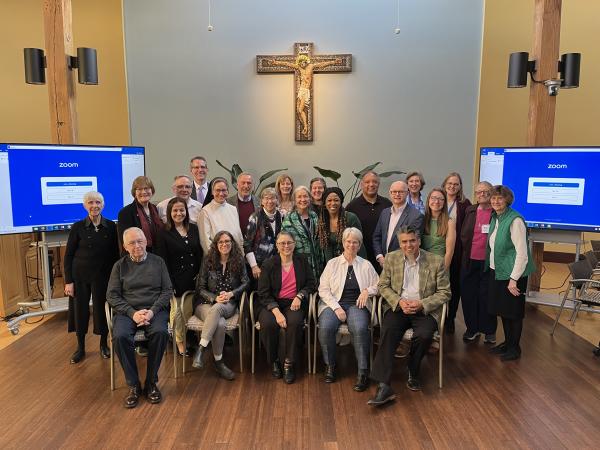Embarrassing to admit, but this morning is the first time I’ve picked up my Give Us This Day in over a week. I can tell because of where the bookmark has been left. March 11. The first day of the Dominican Preaching Network symposium in St. Louis. When I travel, I always pack GUTD with noble intentions of having some sort of rhythm to the start of day and then…. Well, life happens. And last week lots of life happened.
There were 30 of us from the “Catholic preaching world” (yes, there is such a thing!) gathered at Aquinas Institute to be part of a synodal listening experience around the question of lay preaching, particularly within the Eucharist. The synthesis report of the Synod gathering last October invited groups to practice “Conversations in the Spirit” around some of the key themes that emerged at the Synod—including the expansion of ministries in the Church and the greater inclusion of women and youth. At the bottom of this newsletter, I’ll include a link to the fuller document and some of the passages that we paid particular attention to as preachers. But the short of it: Listen we did.
And—wow—what an amazing experience. I know it is still Lent, but it was kind of like Pentecost. When we followed the Conversations in the Spirit process something strange began to happen. One, it really did feel like the Holy Spirit was in the space. Rather than a theological debate on an issue with everyone arguing their own points and digging in their heels, there was a listening for what the synthesis report calls “convergences” and space for trying to hear where we might think differently. With no one’s name attached to anything, there was an ability to wonder out loud without feeling like you had to have all your thoughts fully formed first. Some ideas began to bubble up over and over again. Other ones did not continue to garner attention. And slowly a sort of “communion of mind and heart” among us started to emerge about what was important to carry forward. We are currently working on a group statement to share more widely—including with the USCCB—in the hope it might serve the next Synod gathering in October 2024. The way that it is coming together is so interesting. It does not sound like how any one of us might write it nor like a mishmash of multiple voices, but like the Synod synthesis report itself, spoken in a common voice. I’ll share it here when we have a final draft.
So then what do I find when I sheepishly pick up GUTD again and move the bookmark from March 11 to March 21? That the morning prayer reading is from the prophet Amos 8:11:
“See, days are coming…when I will send a famine upon the land: Not a hunger for bread, or a thirst for water, but for hearing the word of the LORD.”
Yes, I think. Exactly. That is what really grounded our whole gathering last week. Preachers from five different countries, all coming with unique stories and situations, but united in the sense that people are hungry for good news, and that we are being called to do something about that. Maybe March 21st was just the right day to pick up GUTD again.
A couple sections from the Synod synthesis document that we paid special attention to and that you might like to ponder also:
- “Renewed attention is needed to the question of the languages we use to speak to people's minds and hearts in a wide diversity of contexts in a way that is both beautiful and accessible.” (5.l)
- “We need more creativity in establishing ministries according to the needs of local churches, with the particular involvement of the young. One can think of further expanding responsibilities assigned to the existing ministry of lector, responsibilities that are already broader than those performed in the liturgy. This could become a fuller ministry of the Word of God, which, in appropriate contexts, could also include preaching.” (8.n)
- “Churches all over the world have expressed a clear request that the active contribution of women would be recognized and valued, and that their pastoral leadership increase in all areas of the Church's life and mission. In order to give better expression to the gifts and charisms of all and to be more responsive to pastoral needs, how can the Church include more women in existing roles and ministries?” (9.i)
- “As members of the faithful People of God, all the baptised are co-responsible for mission, each according to his or her vocation, competence and experience. Therefore, all contribute to imagining and discerning steps to reform Christian communities and the Church as a whole.” (18.a)
There are many other gems, though, so don’t stop there! You can read the whole document here. Super readable.
P.S. Before going I have one other sweet moment to share with you which is the conversation I had with Dr. Kimberly Baker of the Women of the Church community. Even before I’d finished writing Redeeming Power, Kimberly contacted me to do an interview about the book, similar to the marvelous event she did when Carolyn Woo’s book on women in leadership came out a couple years back. Kimberly is such a gracious host. Women of the Church’s way of convening is part of what inspired Chapter 4 in Redeeming Power. Kimberly is always thinking about how to make people feel comfortable and at home in her presence, and how to organize and share the convening role so that many people can share “power.” Here is a link to the conversation we had Tuesday night. It’s one of the first times I’ve taken Q&A on the book and it was really fun. A great group!
